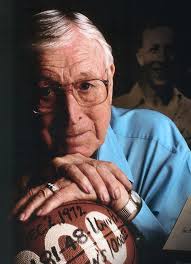 A couple of years ago I had the pleasure of meeting fellow consultant Al Ritter, of Ritter Consulting Group, based out of Geneva, Illinois. Al is a talented and charismatic man who works with leaders in mid-size to large companies who tend to neglect the most important thing that gives them 80% of their results.
A couple of years ago I had the pleasure of meeting fellow consultant Al Ritter, of Ritter Consulting Group, based out of Geneva, Illinois. Al is a talented and charismatic man who works with leaders in mid-size to large companies who tend to neglect the most important thing that gives them 80% of their results.
His consulting firm helps leaders generate unprecedented results in sales, earnings and associated measures by showing them how to dramatically improve the relationships among themselves and their employees.
Al shared with me his unforgettable meeting with legendary basketball coach John Wooden, and how that conversation changed his life. Enjoy!
What I Learned About Business Leadership From John Wooden
By: Al Ritter
I have been a leadership coach for the past two decades for Fortune 500 CEOs and other senior leaders. Much of my success, or more accurately the success of my clients, is due to the wisdom of John Wooden, the great former UCLA basketball coach, who passed away at age 99 on June 4th, 2010.
Mr. Wooden won 10 national championships, a record unlikely to ever be equaled. Many have called him a national treasure. I concur, and would add that he was a treasure chest of great wisdom in many domains of life beyond basketball, including business.
In 1989, just before I became an executive coach, I had the good fortune to spend a few hours with Mr. Wooden during one of his Chicago visits. He was willing to see me because of his relationship with two of my former coaches. After the normal pleasantries, I asked Mr. Wooden this question: “What is the one thing you did that made you such a masterful leader and coach?”
His answer changed my life, and shortly thereafter began to change the lives of my clients. His answer: “Most coaches have one commitment, and that is to winning. I had a dual commitment—to winning, and also to relationships—and I was equally committed to both.”
I was astounded by his answer because as a corporate business leader earlier in my career, I had certainly fulfilled on his first commitment, but had not even given much thought to the second. Mr. Wooden then elaborated on how he fulfilled on those two commitments, never compromising one for the other.
That definition of leadership, and other leadership principles I learned that day, have played a major role in my business coaching practice the last 20 years. Here are some of the most important principles Mr. Wooden spoke about and how they apply to business leadership.
1. Live the Dual Commitment—to Both Results and Relationships.
As Mr. Wooden said years ago, “the drive to win is a good thing, but when that drive becomes single-minded, it often leads to insensitivity to people. The coach, by relentlessly focusing on winning, can, over time, damage the team’s performance”.
Most of my corporate clients, when they begin working with me, mirror the way I used to be in my corporate career—a strong commitment to Results and a relatively weak commitment to Relationships. However, when those same business leaders learn how to fulfill on both commitments, key performance measures including sales and earnings typically reach unprecedented, sustainable levels. I have seen that happen with thousands of my business clients the last twenty years.
More….
2. Implement the Discipline of Execution.
Mr. Wooden insisted his players and coaches, including himself, be on time, and keep their word about everything, big and small. He expressed this axiom: “powerful results require disciplined actions, where everyone can be counted on”.
To generate the results they want, business leaders need to cause powerful actions to be implemented in a coordinated, clear manner, where each person’s word is their bond.
3. Be Transparent.
This means admitting you’re not perfect, that as a leader you can learn from anyone. One of Mr. Wooden’s favorite expressions was “it’s what you learn after you think you know it all that really counts”.
In business, the most effective leaders realize the first person to lead is themselves. In other words, they have self-awareness. This requires the counter-intuitive practice of leaders asking for feedback from the people around them on what’s working and not working. That kind of vulnerability is actually a sign of strength, not weakness, and creates great value for the business and the people in it.
4. Slow Down in Order to Speed Up.
One of John Wooden’s favorite phrases was “be quick, but never be in a hurry”, meaning be alert, be diligent, think, but don’t be in a rush, don’t be careless, don’t take things for granted.
Of course, this principle relates to business in a big way, if one looks no further than the many business crisis in the news. Effective leaders must overcome the many characteristics of our times that push leaders to react, rather than reflect and think.
MR. WOODEN, ON BEHALF OF BUSINESS LEADERS EVERYWHERE, THANK YOU!
Al Ritter helps CEOs, other leaders and their teams become great leaders – Servant Leaders. Since 1997, Ritter Consulting Group has worked with thousands of clients — primarily with the leaders and teams of mid size and large companies across all industries. Through his consulting and programs he’s helped them dramatically increase profitability and effectiveness. Please visit Ritter Consulting Group to learn more about his fantastic work in creating Servant Leaders.
For the month of August, Najera Consulting Group will be conducting Free 1 Hour Strategy Sessions for a limited number of owners of small to medium sized businesses and non-profit executive directors.
Schedule Your Session Today and:
• Gain better clarity of your organization’s vision.
• Uncover hidden challenges and blind spots that could be sabotaging your success
• Leave this session renewed, inspired, and re-energized about your business or non-profit.
Space is Limited. Click here to contact us with the subject line, “Free Strategy Session” or call: 630-326-3238


















Sorry, the comment form is closed at this time.